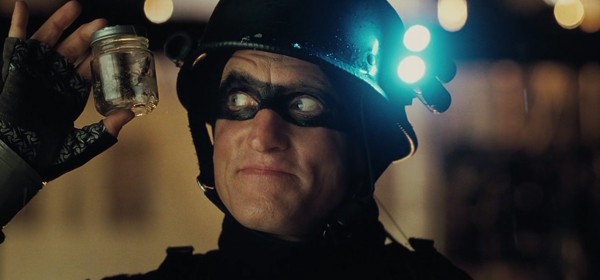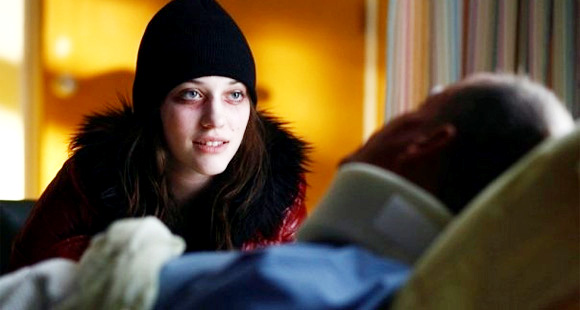Arthur Poppington is Defendor, masked (although the mask is painted on) vigilante armed with a trench club, a camera strapped to his helmet, and various other small gadgets (such as a jar of ravenous wasps and pouchful of marbles.)
PART THREE: DEFENDOR
The Selfless Defendor
His sole goal within this identity is to find the one responsible for his mother’s death: Captain Industry. On the prowl, he happens upon a corrupt cop, Dooney, and believes him to be connected to Captain Industry. The beating he gives Dooney lands him in the nearest police station where Captain Fairbanks, officer responsible for Arthur’s case, notices that Arthur may be mentally challenged and releases him.
Defendor promptly tracks down Dooney once more, but this time, he receives a hard beating at the hands of Dooney’s men. He’s rescued and brought back to the construction depot he operates out of by Angel, a crackhead prostitute. Angel, in order to coerce Arthur to let her stay with him, tells him that she knows where Captain Industry is, which Arthur, naturally, believes. In the meantime, Arthur’s boss and friend, Paul, arrives and is shocked to see where Arthur is, and with whom. He offers Arthur a place with his family, but Arthur will have none of it.
Arthur quickly stakes out Dooney, but breaks his stealth due to a small accident and is shot. While he is in the hospital, it is revealed that there is an undercover cop with Dooney, who shot Arthur with training bullets in order not to kill him without blowing his cover. A semi-conscious Arthur, overhears Angel and Paul talking by his bed, where Angel reveals that her father abused her when she was a child. Arthur, once fully conscious, proceeds to leave the hospital (still wearing the hospital gown,) find Angel’s father at his dry cleaner’s, beat him, throw him through a window and stick him in a garbage can. This lands Arthur in court, after a lengthy psychiatric evaluation, whereby he is made to swear he will not be Defendor again. Without his support, Angel tries to return to Dooney, who takes her hostage and sends a note to Arthur, warning him to stay out. This prompts Arthur to don the guise of Defendor one final time, this time to save Angel, but Angel manages to escape herself and meets him halfway. Arthur reveals that he intends to go after Captain Industry.
© screened.com
She confesses that she lied, but Arthur is resolute. He thus proceeds to make a one-man stand against an arms shipment, and fares very well until “Captain Industry” (actually Radovan Kristic, Russian arms dealer and Mafioso) and he have a stand-off. Believing himself impervious to bullets (as per the training bullets incident) Arthur is shot several times. It is revealed in a flashback that “Captain Industry” is a misunderstanding on Arthur’s part: his mother was a drug addict, and died from an overdose. When his grandfather, in grief, told Arthur that “captains of industry” were responsible for this (albeit, he means indirectly), Arthur took it to heart to mean a single person was responsible.
Arthur dies in Angel’s arms, with Angel promising him to turn her life around. It is revealed that Defendor, after his final act, has become somewhat of an icon for justice and standing up for what is right, and Angel has picked herself up, after all.
Limitations and Breaks from Reality
“Defendor” is an interesting case study. It primarily focuses on something touched upon in the previous installments of this series: the insertion of fiction into reality in order to make sense of the act of flatscan heroism. “Defendor”s take on this is a bit more severe than the previous examples, as Arthur is shown to be somewhat detached from reality on a good day. His isn’t an insertion of fiction, his is an almost clean break from reality itself, complete with its own set of realities. His misinterpretation creates this distorted reflection of facts, such as the existence of a villainous Captain Industry who deliberately killed his mother, that he is, in fact, impervious to bullets and is capable of coming out on top – that one, he owes to the various (rare) comic books cluttering his sleeping space. That Defendor is a bona fide hero, carrying some mannerisms of Batman (especially Woody Harrelson’s magnificent “Batman voice” which is reminiscent of Kevin Conroy’s legendary take) as well as that of comic book cliches (speaking in supposedly “epic” phrases when in costume/character.)
© mania.com
This break from reality on Arthur’s part does not extend to the world around him, which contrasts his innocent idealism with harsh reality. As it has been stated prior in this series, the main problem with an act or a series of acts of vigilantism, is that it is illegal. The first act of Defendor is to assault Dooney, yes, and while corrupt, Dooney is still a police officer. This lands Arthur in the police station, and the only things that gets him off the hook is the fact that his mental instability is apparent, and the officer interrogating him, Captain Fairbanks, recognizes this. He does warn Arthur that law enforcement is not his business.
The break from reality in terms of events also does not extend, unfortunately, to Arthur triumphing over all odds, since “Defendor” takes the limitations of flatscan heroism, as mentioned before, as absolute. Arthur is, when broken down, a civilian who is out in the streets, intending to tangle with corrupt cops and mafia henchmen, whose main weapons of choice are guns and knives. Arthur has no protective gear, save for knee and elbow pads – his “costume” is a black-on-black outfit with Defendor’s “D” duct-taped on (literally.) The strongest weapon he has is a trench club, his grandfather’s, and his other means of attack include a jar filled with angry wasps (no, really,) marbles to make his opponents slip and fall. The tape recorder and camera is to record evidence, wherever it may be – but such evidence is inadmissible in court, since it hasn’t been obtained through legal means.
However, while some of the previous breaks were deliberate and involved forceful detachment for the sake of something-or-other, it has to be said that Arthur’s fiction, Defendor, is depicted as being almost entirely innocent. He genuinely believes in what he is doing, as much as he genuinely believes Captain Industry is out there. Of course, his innocence is taken out of the realm of the ordinary for the sake of the extraordinary task he has set for himself. Paul, at one point after his trial, mentions to Arthur that Arthur once saved his son’s life (which is implied to be how they became acquainted) and he wasn’t Defendor when he did that. This line of reasoning is crucial, since it points to the underlying thought underneath the idea of the movie itself: that a hero isn’t one who wears a cape and flies around, but instead an ordinary man who does, or resolves to do, extraordinary things.
This theme is prevalent in flatscan hero fiction: that it only takes some random person to go out there and start doing something. “Kick-Ass” gave a more self-serving primary motivation, “Super” dealt with the distractions of a primary goal, but “Defendor”, while presenting a hero with a primary, desired goal, is so much more than just the sum of this particular objective, but is the purity of motivation. Of course, it could be argued that while most flatscan heroes’ fiction insertion is what “allows” them to become who they are, Arthur’s break from reality is who he is in the first place.
© ugo.com
The Choice of Non-Choice
Defendor, as an idea, is an interesting grey area where the issue of whether he actually, consciously chose to become Defendor in the first place. This feeds into a dichotomy previously mentioned in the “Super” article – that some heroes are chosen, while some choose to be who they become. In this particular case, it is nearly impossible to tell.
Arthur’s determination and drive indicates, always, that he chose Defendor as an identity, a way to cope with the fact that Captain Industry had killed his mother. He chooses to be Defendor in order to avenge her death. But on the other hand, there is the implication that nobody else knows, or worse, cares that Captain Industry killed his mother, which would make his situation one of the chosen hero, instead of the chooser – the responsibility, which comes from this knowledge, falls unto him, because he is the one who is awake.
This is where “Defendor” subtly presents Arthur’s predicament: the choice of no-choice. A chosen hero in the vein of Spider-Man acts in accordance with a moral code, of having been chosen for this, and there is no avoiding it. Arthur has no such position far as the allocation of “heroic responsibility” is concerned, thus he chooses to avenge his mother. But his choice is also driven by the fact that only he knows that Captain Industry exists, and since this knowledge imbues him with a certain responsibility, he feels compelled to act. It can be said, then, he chooses to be chosen. He is without a choice in that he is in a unique position – nobody else knows, believes him, or cares. But he has a choice in becoming Defendor and picking up a vigilante personality, which, Captain Fairbanks also points out, is contrarian: wearing a badge is the surest way to attempt to enforce the law.
The issue is reflected on one of the traits sought after in a hero: self-sacrifice. It is a core idea that a hero is one willing to sacrifice himself and things pertaining to himself for the sake of other people, for an idea, or just to stop evil on general principle. Defendor’s last stand is built upon this: with nobody else willing to do anything, with Angel abducted and Captain Industry within a position to be found and stopped (lest he continue his evil,) Arthur risks incarceration, physical harm and death just because he, once again, chooses to be chosen: he knows where Captain Industry is, and what’s happening, and while he could simply call the police, he chooses to become Defendor one last time.
Also clouding the issue is the fact that Arthur isn’t playing with a full deck. The Batman parallel used previously somewhat applies here as well, where the masked vigilante Batman is both what Bruce Wayne feels is his true self, but is also, undeniably insane. Arthur isn’t quite that far gone yet, but he can’t discern the fact that the fiction of Defendor, an idea that makes perfect sense to him, is an outlier in and of itself. Becoming Defendor is ultimately, at risk of repeating it, a choice. But Arthur’s choice isn’t motivated by rationality, choice or a raging need to make sense of it all (a-la Batman,) it’s motivated by his perception that there is a supervillain out there, and the only thing that can stop a supervillain is a superhero. It is shown that Arthur is a comic book fan, and it is apparent that his flatscan heroism is motivated primarily by his perceptions, as shaped by pure fiction.
Defendor’s End
Unfortunately, “Defendor” takes fiction-insertion into reality prevalent in the concept of a flatscan hero as a mistake, and chooses to plant the said flatscan inside a world he does not completely understand the workings of. This also parallels the movie’s overall perception that what Defendor is attempting to do isn’t only futile, it’s (fatally) unfeasible. The latter isn’t something new, as flatscan heroism suffers from several core limitations that have already been outlined, but the previous installment, “Super” had the idea that a flatscan hero can rise to the occasion with the right tools, that is, his enemies’ tools. Arthur’s insistence that a trench club and marbles is enough to tackle rough-tough gangsters and arms dealers is what makes Arthur a danger to himself – “Defendor” is built on the idea that inserting such fiction into reality will result only in the rejection of the said fiction, since it simply does not (and cannot) mesh with reality. The term “cruel world” has a certain bearing on this, as the contrast of wide-eyed idealism to cynical realism is what marks “Defendor” and brings Defendor’s end.







